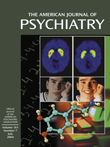Benzodiazepines Versus Antidepressants for Panic Disorder
To the Editor: A recent study by Dr. Bruce et al. reported that “Despite efforts aimed at increasing the use of SSRIs in patients with panic disorder (e.g., APA’s practice guideline for panic disorder, Food and Drug Administration approval of particular SSRIs for the treatment of panic disorder), only a modest increase in their use was found” (p. 1432). Benzodiazepines were found to be the most commonly used medications for panic disorder.
This statement and the findings bring up several questions. One of them is, how much are we all under the influence of the pharmaceutical industry? Who is making the greatest effort to use SSRIs, originally categorized or miscategorized as antidepressants, for anxiety disorders? Certainly the pharmaceutical industry is. Should we ignore the response of the market—i.e., in spite of all the more or less scientific evidence—that benzodiazepines are liked and considered effective, efficacious, and well tolerated by patients with anxiety disorders and their physicians? Benzodiazepines have been found to be effective in the treatment of various anxiety disorders (a review of the evidence is beyond the scope of this letter), and some of them have also been approved by the Food and Drug Administration for the treatment of panic disorder (e.g., alprazolam). During the treatment of panic disorder, many clinicians have found benzodiazepines useful in various situations, including breakthrough panic anxiety and fear of flying, and only when needed. Certainly, benzodiazepines have disadvantages, namely, the physiological dependence potential. Nevertheless, SSRIs have also several disadvantages (mentioned by Dr. Bruce et al.), and it is questionable whether they have the most favorable balance of efficacy and adverse effects for the treatment of panic disorder.
Each new product undergoes the process of reevaluation, at times a sobering one, after its initial enthusiastic use. SSRIs are no exception. They appear to have more problematic adverse effects than originally thought and observed. Also, as noted by Dr. Bruce et al., no large controlled comparison study has been conducted to examine the superiority of SSRIs over benzodiazepines for the treatment of panic disorder. Maybe the time for such a large study has come.
In the meantime, we should treat our patients with whatever is helping them the most. And we should also ask, along with Healy (1), “In contrast to other areas of business, do pharmaceutical corporations follow what the markets dictate, or like other corporations, can they shape the marketplace into which they sell their products?”
1. Healy D: The antidepressant drama, in Treatment of Depression. Edited by Weissman MM. Washington, DC, American Psychiatric Press, 2001, pp 7–34Google Scholar



